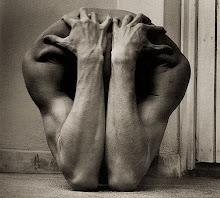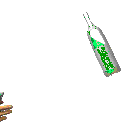Absinthe in New Orleans
WHAT IS ABSINTHE?
And what does it have to do with New Orleans?
Absinthe is a strong herbal liqueur distilled with a great number of flavorful herbs like anise, licorice, hyssop, veronica, fennel, lemon balm, angelica and wormwood (the flavor of anise and/or licorice, at least in contemporary forms of the liquor, tends to predominate). Wormwood, the one that's gained the most notoriety, is Artemisia absinthum, an herb that grows wild in Europe and has been cultivated in the United States as well. Much of the liquor's legendary effect is due to its extremely high alcohol content, ranging from 50% to 75% (usually around 60%), plus the contribution of the various herbs. It has been assumed by many that the so-called "active ingredient" in absinthe is wormwood, although that is apparently not really the case.
It was traditionally served with ice water and a cube of sugar; the sugar cube was placed on a slotted "absinthe spoon", and the water was drizzled over the sugar into the glass of absinthe (typically in a 3:1 or 4:1 ratio). The sugar helped take the bitter edge from the absinthe, and when the water is drizzled into the the liquor it all turns milky greenish-white (the effect is called "louche").
The drink was referred to in France as "La Fée Verte", or The Green Fairy, which is a reference to its often dazzling green color (depending on the brand). The color usually came from the chlorophyll content of the herbs used in the distillation process; however, some disreputable manufacturers added toxic chemicals to produce both the green color and the louche (or clouding) effect that in reputable brands was caused by the precipitation of the essential oils of the herbs. It is quite probable that the bad reputation absinthe developed was due to these low-grade and perhaps quite poisonous version of the real thing.
Wormwood had been used medicinally since the Middle Ages, primarily to exterminate tapeworm infestations while leaving the human host uninjured and even rejuvenated by the experience. At the end of the 18th century -- the age of revolution and skeptical humanism -- the herb developed a recreational vogue. People discovered they could get high off it. The problem was the means of delivery, as it was unacceptably bitter in taste.
A French expatriate living in Switzerland by the name of Dr. Ordinaire found the answer by inventing absinthe, which delivered both the herb and alcohol in a stunningly tart beverage, with a flavor resembling licorice. The most well-known maker of absinthe was French distiller Henri-Louis Pernod, who was impressed with Dr. Ordinaire's beverages and purchased the secrets of its distillation and manufacture. Absinthe would eventually enjoy its greatest popularity in fin-de-siècle Paris, with Vincent Van Gogh, Paul Verlaine, Alfred Jarry and Oscar Wilde among its most ardent imbibers.
Given the French character of the Crescent City, absinthe achieved quite a bit of popularity in New Orleans as well, where it was widely consumed by people from artists to musicians to Storyville madams. Visitors to New Orleans can still check out the beautiful, ornate spigot at the Old Absinthe House bar on Bourbon Street; it was used to drip cold water over the sugar into the beverage. (Note: I haven't been to that bar in a while, but I understand it was recently sold and gutted; I'm not sure the original spigot is still there.)
Around the turn of the century, after observing a subset of alcoholism referred to as "absinthism", and noting that heavy absinthe users had a propensity toward madness and suicide, by the second decade of this century it became banned in the Western world, unfairly lumped in with opiates, cocaine, and marijuana when it is, in fact, just another alcoholic beverage (although one with unique properties). Although the effects of thujone can be toxic when consumed in very large quantities, this substance is found in properly made and distilled absinthe in only the smallest trace amounts. The most popular misconception about absinthe is that it is a drug. "Not so!" says the Fée Verte FAQ. As for the so-called "secondary effect", we refer you again to the FAQ:
[Q]uality absinthe, properly distilled, does have a different effect over and above the results of alcohol, though at up to 70%, the effects of the alcohol alone can be considerable. Absinthe's effects, despite popular conception, are not due to the wormwood (Artemisia Absinthia) alone. Absinthe's constituents consist of a very delicate balance of various herbs, most of which contribute in one way or another to its intoxicating effects. [Chemist and absinthe expert] Ted Breaux once explained it that it is a push-me, pull-you effect of the various herbs, as some are of an heightening effect, and others are lowering. The effect on the individual is subjective, and can best be described as a kind of heightened clarity of mind and vision, mildly ponderous and sparkling, and warmed by the effect of the alcohol. This seems to wear off after 20 or 30 minutes, leaving one with an alcohol buzz. 2-3 glasses seems to do the trick. More than that, depending on the proof of the alcohol, will just make you very drunk.But saying all that, 'secondary effects' seem to be quite subjective. Some have never felt them at all. Some say one brand works for them, others another. Many absintheurs ... have placed absinthe's 'effects' low on their priority list when it comes to judging modern commercial absinthes, preferring to focus on actual herbal constituents, manufacture and historical detail.









2 Comments:
What is meaning of jejune, please?
jejune
je·june Pronunciation (j-jn)
adj.
1. Not interesting; dull: "and there pour forth jejune words and useless empty phrases" Anthony Trollope.
2. Lacking maturity; childish: surprised by their jejune responses to our problems.
3. Lacking in nutrition: a jejune diet.
[From Latin iinus, meager, dry, fasting.]
je·junely adv.
je·juneness n.
ThesaurusLegend: Synonyms Related Words Antonyms
Adj. 1. jejune - lacking in nutritive value; "the jejune diets of the very poor"
insubstantial
unwholesome - detrimental to physical or moral well-being; "unwholesome food"; "unwholesome habits like smoking"
2. jejune - displaying or suggesting a lack of maturity; "adolescent insecurity"; "jejune responses to our problems"; "their behavior was juvenile"; "puerile jokes"
juvenile, puerile, adolescent
immature - characteristic of a lack of maturity; "immature behavior"
3. jejune - lacking interest or significance; "an insipid personality"; "jejune novel"
insipid
uninteresting - arousing no interest or attention or curiosity or excitement; "a very uninteresting account of her trip"
Post a Comment
<< Home